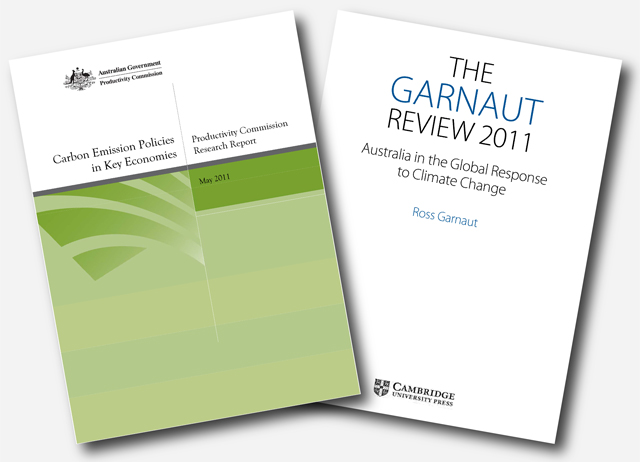The current hysteria being whipped up against a carbon tax is not a good basis for business to come out against it. [21 June 2011 | Peter Boyer]

Analyses by the Productivity Commission (left) and Ross Garnaut (right) both support a carbon pricing scheme as the centrepiece for climate policy.
The daily news is telling us that the proposed tax on carbon emissions is about as popular as a tramp at a debutants’ ball, and that it will bring down the Gillard government
It’s a view Tony Abbott would happily endorse.
While Abbott’s unremitting war on a carbon price turns up daily set pieces for the news cameras, Julia Gillard has been forced into the back-rooms, working through complex negotiations with the cross-benchers and key business and NGO stakeholders to shore up support for her tax bills.
The thunderous anti-tax barrage by Abbott and his team, with Senator Barnaby Joyce (never lost for words) as a lead attack dog, has made it hard to discern alternative views. The clear small voice of reason seems to be losing out in the struggle for clear air.
As a no-tax bandwagon appears to gather momentum, some business sectors have climbed aboard. Master Builders Australia has said its modelling showed a carbon tax was likely to add 5 per cent to building and construction costs, and a report for the Australian Coal Association claimed that a carbon price of $20 a tonne would force eight coal mines to close within three years, “putting at risk” over 4000 jobs. Within a decade, it said, 18 mines could close and Australia could forgo coal sales of $22 billion.
Apparently infected with a general air of negativity, Heather Ridout, CEO of the Australian Industry Group, has demanded that “ludicrous” policy options such as a $40-a-tonne starting price and a ban on future coal mines be taken off the government’s carbon tax agenda.
All well and good. Ridout has brought important business interests to the table in giving her support in principle to Labor’s tax policy. But her list of “ludicrous” options omits to mention a significant one at the other end of the spectrum — the Opposition’s “no tax” policy.
This is the nub of the problem. While parts of the business community seem to feel obliged to lash out at “green” agendas, or at the tax as a whole, they are failing to put their considerable weight behind the ever-growing imperative to put an effective price on carbon emissions.
Ridout’s Australian Industry Group is at least represented in the government’s tax discussions, but others have stayed out of the debate. As a result, some business sectors may be significant losers.
Malcolm Turnbull’s Opposition played a big role in negotiations over Labor’s first carbon pricing scheme, securing some impressive, if controversial, deals on behalf of mining and other carbon-intensive and trade-exposed industries before Turnbull’s demise saw the scheme rejected.
The main focus of Abbott’s campaign, on the other hand, has been Australia’s “mums and dads”: the household budget. On the back of steadily-climbing energy bills (rises which have nothing to do with a carbon tax), he’s claimed that people will be hit from all directions when the tax measures come into play.
In response, the Gillard government has promised to return more than half the revenue from a carbon tax to households. It will also invest heavily in renewable energy while seeking to ensure the budget returns to surplus by mid-2013. That leaves precious little for industry compensation.
Opposing the scheme outright and pledging to repeal it if it wins power, the Coalition has effectively ruled out arguing for a better deal for business under a carbon tax scheme. Its all-or-nothing approach looks a winner today, but there are signs that it won’t be such an easy sell after the scheme’s introduction next year.
Opposition to a carbon tax may be soft, if responses to a couple of recent national initiatives are any guide. One of these was GetUp’s “day of action” early this month when tens of thousands turned out in centres around the country in support of a carbon pricing scheme.
Another initiative, a four-month effort organised by a national group called “100 per cent Renewable Energy” to highlight the case for renewable energy and a carbon price, brought an overwhelmingly positive response. The campaign took in Hobart and Launceston as well as dozens of mainland centres. Volunteers recorded the views of over 14,000 people, more than three-quarters of whom supported a price on carbon. Even bigger majorities supported strong public investment in renewable energy.
These are not objective measures, but they are indicators of strong feelings among large numbers of people in favour of effective climate action. There are other signs that business needs to drop the anti-tax rhetoric and start focusing on practical outcomes of a carbon tax.
Asked by the government to report on how emissions-reduction measures by our major trading partners compare with our own, the Productivity Commission found that carbon pricing schemes were “relatively cost-effective” compared to support for small-scale renewable energy and biofuels.
That got a tick of approval from key independent MP Tony Windsor, and from Professor Ross Garnaut, who in his final report to government released late last month had argued strongly that Australia is presently a drag on the international effort, a position which a carbon price scheme will help to address.
The oft-repeated claim that Australia is too small a world player to make a difference got this response from Garnaut: “This is an argument that Australia is a piss-ant country. Well, I do not accept that Australia is a piss-ant country.”
Nor do I.
